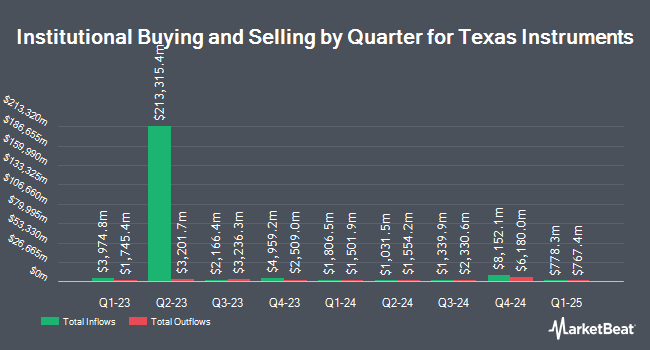Migdal Insurance & Financial Holdings Ltd. acquired a new stake in shares of Texas Instruments Incorporated (NASDAQ:TXN - Free Report) in the first quarter, according to the company in its most recent Form 13F filing with the SEC. The fund acquired 2,955 shares of the semiconductor company's stock, valued at approximately $531,000.
Other hedge funds have also recently modified their holdings of the company. Norges Bank bought a new position in Texas Instruments in the 4th quarter worth $2,584,490,000. GAMMA Investing LLC boosted its holdings in shares of Texas Instruments by 21,778.6% during the 1st quarter. GAMMA Investing LLC now owns 3,422,027 shares of the semiconductor company's stock valued at $614,938,000 after purchasing an additional 3,406,386 shares during the last quarter. Jennison Associates LLC boosted its holdings in shares of Texas Instruments by 2,898.0% during the 1st quarter. Jennison Associates LLC now owns 2,214,471 shares of the semiconductor company's stock valued at $397,940,000 after purchasing an additional 2,140,605 shares during the last quarter. Invesco Ltd. boosted its holdings in shares of Texas Instruments by 15.4% during the 4th quarter. Invesco Ltd. now owns 11,893,157 shares of the semiconductor company's stock valued at $2,230,086,000 after purchasing an additional 1,587,036 shares during the last quarter. Finally, Northern Trust Corp boosted its holdings in shares of Texas Instruments by 12.2% during the 4th quarter. Northern Trust Corp now owns 10,398,010 shares of the semiconductor company's stock valued at $1,949,731,000 after purchasing an additional 1,132,187 shares during the last quarter. Institutional investors own 84.99% of the company's stock.
Analyst Ratings Changes
A number of research analysts recently commented on the stock. Truist Financial lowered their price target on shares of Texas Instruments from $195.00 to $171.00 and set a "hold" rating for the company in a report on Thursday, April 24th. Barclays lowered shares of Texas Instruments from an "equal weight" rating to an "underweight" rating and reduced their price objective for the stock from $180.00 to $125.00 in a research report on Tuesday, April 22nd. Seaport Res Ptn raised shares of Texas Instruments to a "strong sell" rating in a research report on Wednesday, April 30th. The Goldman Sachs Group initiated coverage on shares of Texas Instruments in a research note on Thursday, July 10th. They set a "buy" rating and a $255.00 price objective on the stock. Finally, Cantor Fitzgerald dropped their price objective on shares of Texas Instruments from $200.00 to $170.00 and set a "neutral" rating on the stock in a research note on Thursday, April 24th. Three investment analysts have rated the stock with a sell rating, fifteen have assigned a hold rating, eleven have given a buy rating and two have assigned a strong buy rating to the company. According to data from MarketBeat, Texas Instruments presently has a consensus rating of "Hold" and a consensus price target of $204.87.
Get Our Latest Research Report on Texas Instruments
Texas Instruments Stock Performance
Texas Instruments stock traded up $0.03 during midday trading on Friday, hitting $216.62. 4,535,481 shares of the company's stock were exchanged, compared to its average volume of 6,466,299. Texas Instruments Incorporated has a 12-month low of $139.95 and a 12-month high of $221.69. The company has a debt-to-equity ratio of 0.78, a quick ratio of 3.37 and a current ratio of 5.26. The stock has a market cap of $196.79 billion, a price-to-earnings ratio of 41.10, a price-to-earnings-growth ratio of 3.53 and a beta of 1.03. The firm's 50 day simple moving average is $199.35 and its 200 day simple moving average is $185.24.
Texas Instruments (NASDAQ:TXN - Get Free Report) last issued its earnings results on Wednesday, April 23rd. The semiconductor company reported $1.28 earnings per share for the quarter, beating the consensus estimate of $1.06 by $0.22. The business had revenue of $4.07 billion for the quarter, compared to the consensus estimate of $3.91 billion. Texas Instruments had a net margin of 30.36% and a return on equity of 28.75%. The business's quarterly revenue was up 11.1% compared to the same quarter last year. During the same quarter in the previous year, the firm earned $1.10 earnings per share. Equities research analysts predict that Texas Instruments Incorporated will post 5.35 EPS for the current year.
Texas Instruments Dividend Announcement
The company also recently disclosed a quarterly dividend, which will be paid on Tuesday, August 12th. Stockholders of record on Thursday, July 31st will be given a $1.36 dividend. This represents a $5.44 dividend on an annualized basis and a dividend yield of 2.51%. The ex-dividend date is Thursday, July 31st. Texas Instruments's dividend payout ratio is presently 103.23%.
Texas Instruments Company Profile
(
Free Report)
Texas Instruments Incorporated designs, manufactures, and sells semiconductors to electronics designers and manufacturers in the United States and internationally. The company operates through Analog and Embedded Processing segments. The Analog segment offers power products to manage power requirements across various voltage levels, including battery-management solutions, DC/DC switching regulators, AC/DC and isolated controllers and converters, power switches, linear regulators, voltage references, and lighting products.
Read More

Before you consider Texas Instruments, you'll want to hear this.
MarketBeat keeps track of Wall Street's top-rated and best performing research analysts and the stocks they recommend to their clients on a daily basis. MarketBeat has identified the five stocks that top analysts are quietly whispering to their clients to buy now before the broader market catches on... and Texas Instruments wasn't on the list.
While Texas Instruments currently has a Hold rating among analysts, top-rated analysts believe these five stocks are better buys.
View The Five Stocks Here
Discover the 10 Best High-Yield Dividend Stocks for 2025 and secure reliable income in uncertain markets. Download the report now to identify top dividend payers and avoid common yield traps.
Get This Free Report
Like this article? Share it with a colleague.
Link copied to clipboard.